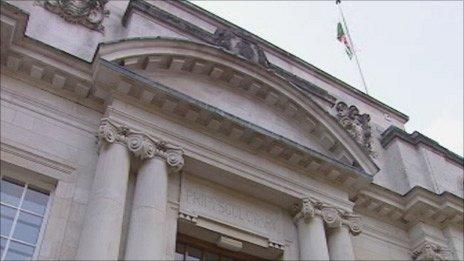Merged University of Wales chief hails 'new beginning'
- Published

The University of Wales said the merger will deliver a new university for Wales
The University of Wales (UoW) says its merger with two colleges is the "start of a new beginning" for the scandal-hit institution.
The 120-year old university is in effect being abolished after BBC Wales' investigations raised questions about its scrutiny of partner colleges.
Vice-chancellor Medwin Hughes said the new organisation was a "strong brand" that ensured UoW's name would continue.
UoW council chairman Hugh Thomas resigned after the merger decision.
Visa scandal
The institution's future had come into question following Welsh government proposals to rationalise higher education.
A merger with Trinity St David in Carmarthen and Lampeter, and Swansea Metropolitan University, was proposed as the way forward.
But a scandal uncovered by BBC Wales involving an alleged visa scam centred on a partner college in London offering UoW validated degrees confounded the plan.
Prof Medwin Hughes, said the three institutions would now be "recreated" under a new brand.
The new vice-chancellor told BBC Radio Wales: "We have secured yesterday that the Wales name will continue within the context of higher education.
'Decent burial'
"Wales needs strong brands. You don't throw away a name - Wales. You don't throw away the name of the university of Wales. Clearly it has to change. Every university has to change."
Prof Hughes said students in the UK and beyond would still be able to finish a University of Wales degree.
Once the merger has taken place, new degrees would bear the name of the three universities, he said.
Following the scandal revelations, education minister Leighton Andrews said UoW had "let Wales down" and "probably requires a decent burial", and called for Mr Thomas to quit.
Last year BBC Wales revealed that a pop star with bogus degrees was running a University of Wales partner college in Malaysia.
It led to a damning report from the higher education watchdog, the QAA, which found serious shortcomings in the way UoW approved other colleges to teach and design courses for its degrees.
Announcing his resignation on Friday, Mr Thomas said the "historic decision" taken by the governing body for merger had led him "to assess what in leadership terms was in the best interests of the transformed university".
A Welsh government spokesperson welcomed the resignation as the "right decision in light of recent events".
"The University of Wales has played an important part in the history of Wales. It's important that any successor institution builds upon that history," they added.
Conservative education spokeswoman Angela Burns AM said: "It is now crucial that lessons are learned and that Welsh higher education regains its credibility".
'Controversy after controversy'
Dr Peter Noyes, vice chancellor of University of Wales, Newport, said the merger "should not detract from a distinguished history lasting 12 decades".
"Wales should be sad that this day has come but those who have played a part in the institution's history, whether graduates, academics or others should look back with fondness on this national institution," he said.
"We are heading towards a future with a transformed higher education sector in Wales and it had become clear that the University of Wales was unable to play a part in that future."
Luke Young, president of National Union of Students (NUS) Wales said: "This was the right decision for the University of Wales to take.
"After the last few weeks where we have seen controversy after controversy, it did become quite clear that the status quo just really wasn't acceptable."
He said merging with Trinity St David and Swansea Metropolitan University was a "better evolutionary process than simply scrapping the brand altogether".
- Published21 October 2011
- Published19 October 2011
- Published19 October 2011
- Published12 October 2011
- Published12 October 2011
- Published7 October 2011
- Published6 October 2011
- Published5 October 2011